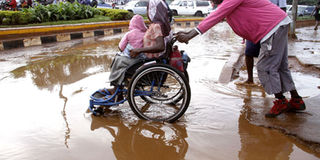Prime
Lack of funding hindering service delivery for PWDs Ministry

A man helping a physically disabled woman to cross a flooded road in Kampala recently. PHOTO BY ABUBAKER LUBOWA
What you need to know:
- According to him, since 1997, the government has been providing affirmative action where slots of 64 students with disabilities are sponsored at public universities which translate to 1,280 as per 2017. However, there is no affirmative action for PWDs to access jobs in the public sector after graduating.
The commissioner of disability and elderly in Ministry of Gender Labor and Social Development, Sam Masaba Wekesa Malso, has said lack of adequate funding and staffing is hindering service delivery to the elderly and people with disabilities.
The recently released Uganda Demographic Health Survey by Uganda Bureau of Statistics (UBOS) shows 12.5 per cent of the county’s population is disabled.
Speaking at a press conference organised by National Union of Disabled Persons Uganda (Nudipu), her partners Federation of Uganda Employers (FUE) and Human Resource Managers Association of Uganda (HRMAU) Mr Malso decried the low level of staffing and funding of gender ministry.
“We are supposed to operate at 100 per cent, but at the ministry there are only 40 per cent staff employed,” he said.
He urged ministry of finance and economic planning plus other development partners to increase funding to ministry of gender so that people with disabilities and the elderly can better be served.
Mr Edison Ngirabakunzi the executive director of Nudipu raised a red flag on non-enforcement of laws that promote employment of people with disability in Uganda.
“For instance Persons with Disabilities Act 2006 section 13(3) mandates the minister in charge of labor to determine a quota of PWDs to be employed in workforce of employers, this has not been enforced by statuary instrument as required,” he said.
According to him, since 1997, the government has been providing affirmative action where slots of 64 students with disabilities are sponsored at public universities which translate to 1,280 as per 2017. However, there is no affirmative action for PWDs to access jobs in the public sector after graduating.
He added that pay as you earn (PAYE) is also harsh to few PWDs employed in formal and informal sectors yet they incur additional costs to purchase assistive devices and hire personal assistants.



